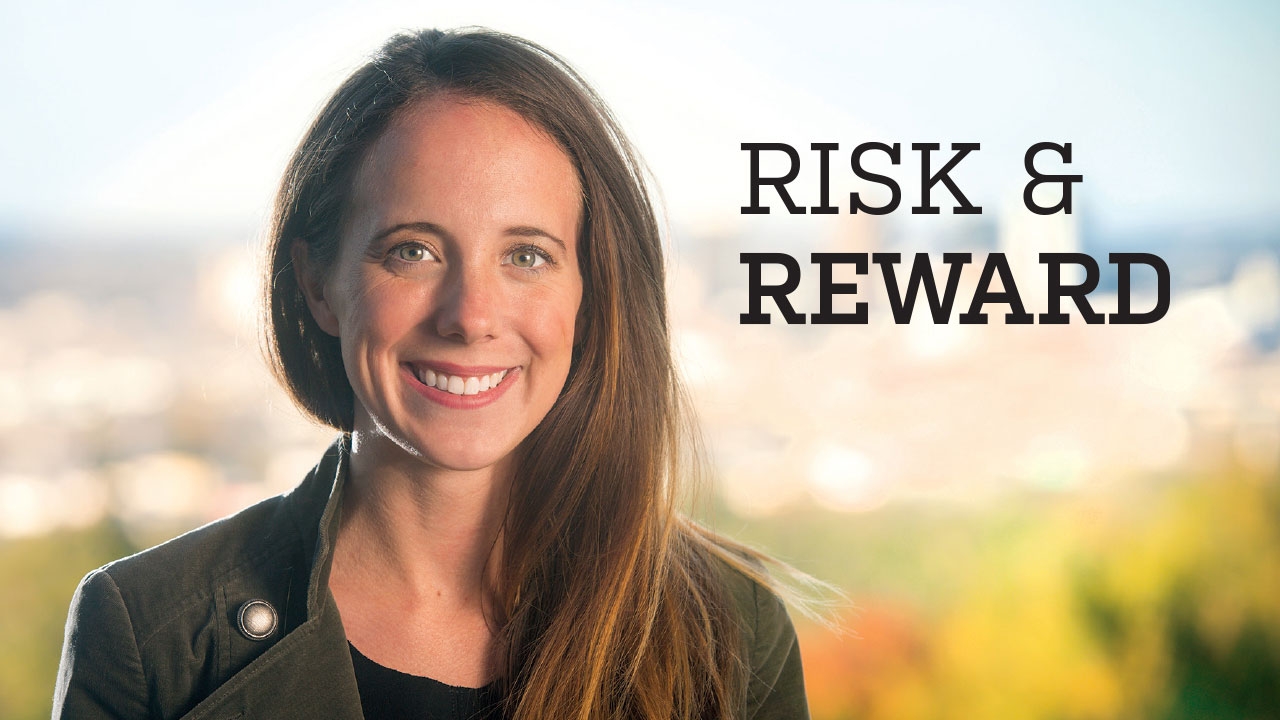Taylor Peake Wyatt founded MotionMobs, a custom software consulting and development firm, during her last semester at UAB’s Collat School of Business. She was only 19 years old—and she credits her youth for a willingness to take risks and work long hours on little sleep. Leaping into the technology industry was daunting, but the potential rewards were thrilling, she says.
“In 2010, I predicted we would see huge growth in mobile adoption,” explains Wyatt (pictured above), the company president, who grew up in Jasper, Alabama. “It wasn’t easy, and it still isn’t. A regular paycheck is convenient, but taking this risk was the right path for me. Being an entrepreneur has always been part of who I am.”
Apps with impact
Today Wyatt’s start-up employs a team of six and has earned a reputation for creating applications for mobile devices and the web that transform the way clients do business, increase efficiency, and generate revenue. Current projects include an on-demand delivery app for convenience stores and a suite of software products for property management. Streamlining is key to the success of any app, from shopping to banking to social media, she says. “Software is about what’s functional for your day-to-day life. The best software makes those tasks easier.”
But she adds it’s important to make sure each app fills a need in the market, and has the potential to make an impact. “Since software isn’t cheap, we must make reasonable projections about time saved, expenses saved, or revenue created as a result of the app,” Wyatt explains.
Incubating ideas
Wyatt chose UAB for its flexibility. She worked full time throughout college and “needed an environment that could provide a quality education and accommodate my crazy schedule,” she says. Originally, she planned to study law and accounting, but a course in programming logic recommended by a professor expanded her horizons, and she switched her major to business information systems. Wyatt says she felt empowered by learning the mechanics of computer coding, and by the idea of building apps to simplify life for herself and others.
She also saw the opportunity to start her own tech firm in Birmingham, which might not have seemed the natural place to launch such a company a decade ago. Wyatt says the sector’s rapid growth and rising national prominence are indicators of the city’s talent and fertile environment, “where people and leaders are willing to give their time to help you along the way with little or no benefit to themselves.”
Working with faculty and local business leaders helped prepare her for “the roller coaster of entrepreneurship,” says Wyatt, who graduated in 2011. “I grew a huge appreciation for Birmingham and our close-knit business community at UAB.” Today, students can test their ideas for new companies in UAB’s Innovation Lab, which brings together the Collat School of Business and Birmingham’s Innovation Depot. There, they can work alongside tech start-ups and partner with community groups such as Women Who Code and Startup Grind Birmingham. The lab also features an app development center and incubation program for launching start-up businesses.
Innovation ecosystem
“If you’re looking to start a company,” Wyatt adds, “Birmingham Business Alliance, the CO.STARTERS program from Create Birmingham and REV Birmingham, TechBirmingham, Alabama Launchpad, VentureSouth, and AIM Group are just a few of the many resources available to entrepreneurs.” She believes the unique ecosystem gives small business owners a competitive edge.
As a small business owner herself, Wyatt eagerly mentors fellow entrepreneurs and advocates for sustainable growth in the tech sector. She serves on the board of REV Birmingham, an economic development organization, and last October, she spoke before Congress about tax-code improvements for small businesses. Wyatt and her husband also purchased a building atop Red Mountain to provide businesses with affordable office space, thus serving as a catalyst for future innovation.
Entrepreneurs should surround themselves with savvy leaders who continuously encourage them to innovate and grow, Wyatt says. She especially enjoys working with other women starting their own businesses. “Mentors for new companies are essential,” Wyatt says. “It’s important for women to see other women excelling in their industry, particularly on a local level.”
What’s Next in Tech?
Wyatt’s company always has its eye on top technology trends. Here are four innovations with game-changing potential, according to MotionMobs chief technology officer Matt Clark:
Machine learning, which gives computers the ability to adapt on their own, is becoming more prevalent and practical. The facial recognition system on Apple’s iPhone X uses machine learning to adjust to changes—such as glasses or a beard—in the user’s face over time. Machine learning also powers devices that rely on speech recognition, as well as self-driving cars. It can even help pick investments in the stock market.
Augmented reality technology lays images and information atop the world around us—without specialized virtual-reality hardware. Pokémon Go may be the most popular AR application to date, but the rapidly expanding technology also can help us do a range of things, from simply measuring a table (using a mobile phone as a ruler) to previewing furniture in a room before we buy.
Scalable cloud computing happens behind the scenes, but it helps ensure a smooth, seamless experience for app users. New services from Amazon and Google, among others, can automatically expand computing capacity as demand rises for a particular app or site.
Voice assistants—like Apple’s Siri, Amazon’s Alexa, Microsoft’s Cortana, and Google’s Assistant—help us access information and complete tasks without lifting a finger, from setting a kitchen timer or switching off the lights to ordering detergent or sending payments. We will rely on them more as they appear in more devices around the house.




